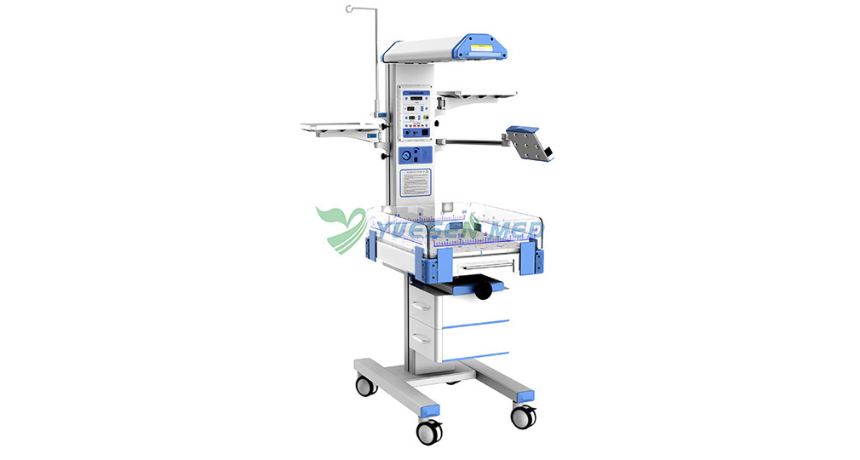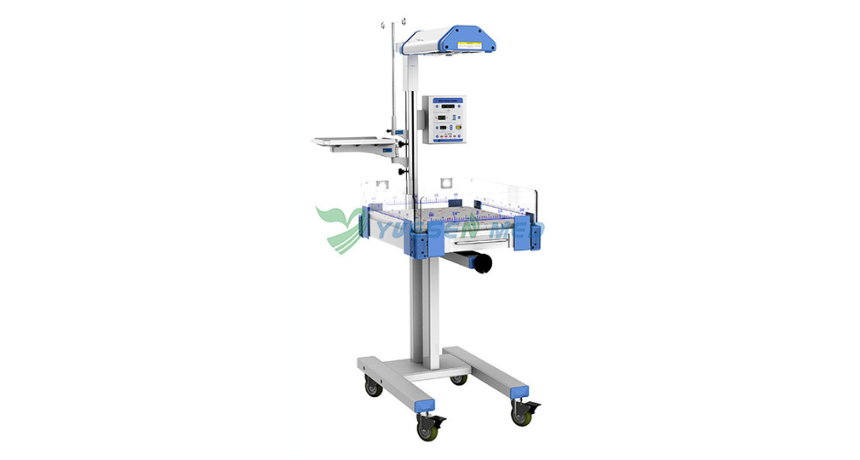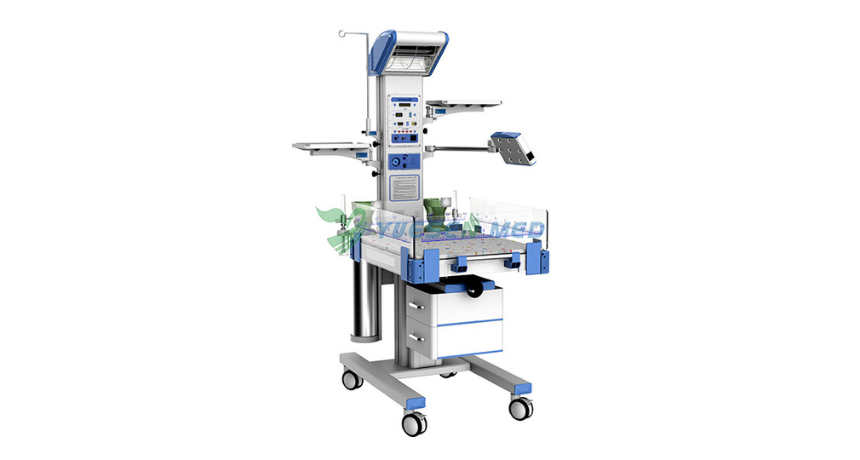Hot Products
YSX500D 50kW DR system set up and put into service in Cambodia.
YSENMED YSX500D 50kW digital x-ray system has been successfully set up and put into service in a hospital in Cambodia.
YSX056-PE serving as a vehicle-mounted x-ray in the Philippines
YSX056-PE 5.6kW portable x-ray unit has been adapted to fit on a truck, to provide mobile x-ray examination service for remote communities in the Philippines.
X Ray Machine To Zimbabwe
x ray machine, 50KW x ray machine
Microscope To Malawi
Achromatic objectives: 4X、10X、40X(S), 100X(S、Oil) Wide field eyepiece: WF10X(WF16X for option) Eyepiece head: Sliding binocular head inclined at 45° Stage: Double layer mechanical stage size 140X140mm, moving range 75X45mm Focusing: Coaxial coarse and
Speed Meets Precision: Exploring the Advantages of Portable Blood Gas and Electrolyte Analyzers
Views : 1175
Update time : 2024-10-14 11:58:24
In the fast-paced world of healthcare, every second counts. When a patient's life hangs in the balance, having the right tools at your fingertips can make all the difference. Enter portable blood gas and electrolyte analyzers—game-changing devices that combine speed and accuracy to deliver vital information in real-time. But what exactly are these tools, and how do they benefit healthcare providers and patients alike? Let's dive into the world of portable analyzers and discover their advantages.

What Are Portable Blood Gas and Electrolyte Analyzers?
Portable blood gas and electrolyte analyzers are compact devices designed to measure the levels of gases (like oxygen and carbon dioxide) and electrolytes (such as sodium and potassium) in blood samples. Unlike traditional lab equipment that can take hours or even days to provide results, these portable units offer immediate feedback, allowing healthcare professionals to make quick, informed decisions.
Why Speed Matters in Healthcare
Imagine you're in an emergency room. A patient arrives with difficulty breathing. Time is of the essence. Quick access to blood gas analysis can reveal whether the patient is experiencing respiratory failure or another critical condition. The faster the results, the faster the treatment can begin. Speed isn't just about convenience; it can literally save lives.
The Precision Factor
While speed is crucial, precision is equally important. Portable analyzers are designed to provide accurate readings, ensuring that healthcare professionals can trust the results. These devices use advanced technology and calibration methods to ensure that the data is reliable, which is vital when making life-altering decisions.
Key Components of Portable Analyzers
1. User-Friendly Interface
Most portable blood gas analyzers come equipped with intuitive touchscreens that simplify the testing process. This ease of use allows healthcare providers to focus more on patient care rather than fumbling with complicated machinery.
2. Compact Size
The portability of these devices means they can be used in a variety of settings—from emergency rooms to remote clinics. Their lightweight design allows for easy transport, making them ideal for on-the-go testing.
3. Battery Operated
Many portable analyzers are battery-operated, providing flexibility in locations where power sources are limited. This feature is especially beneficial in emergency situations or during natural disasters.
4. Rapid Turnaround Time
Results from portable analyzers can often be obtained in just minutes. This rapid turnaround time enables healthcare providers to initiate treatment without delay.
The Role of Technology in Portable Analyzers
Modern portable blood gas and electrolyte analyzers utilize cutting-edge technology to enhance their functionality. From microfluidics to advanced sensors, these innovations contribute to the accuracy and efficiency of the devices.
1. Microfluidics
Microfluidic technology allows for smaller sample sizes, which is particularly useful in pediatric or neonatal care. This means less discomfort for young patients while still obtaining accurate results.
2. Wireless Connectivity
Many portable analyzers now feature wireless capabilities, enabling healthcare providers to send results directly to electronic health records (EHR) systems. This integration streamlines workflows and minimizes the risk of errors associated with manual data entry.
Advantages of Using Portable Analyzers
1. Enhanced Patient Care
With immediate access to critical data, healthcare providers can make timely decisions regarding treatment. This responsiveness can lead to better patient outcomes and higher satisfaction rates.
2. Cost-Effective
While the initial investment in portable analyzers may seem high, the long-term savings are significant. Faster testing reduces the need for additional lab staff and resources, ultimately lowering operational costs.
3. Versatility
Portable analyzers are not limited to emergency situations. They can be used in various settings, including outpatient clinics, home healthcare, and even during patient transport. This versatility makes them invaluable tools in modern medicine.
4. Improved Workflow
With the ability to conduct tests on-site, healthcare providers can reduce bottlenecks in patient flow. This efficiency not only enhances the patient experience but also allows for better resource management within healthcare facilities.
Challenges and Considerations
While portable blood gas and electrolyte analyzers offer numerous benefits, they are not without challenges. Understanding these limitations is essential for effective use.
1. Training Requirements
Despite their user-friendly design, healthcare providers still require training to operate portable analyzers effectively. Ensuring that staff are adequately trained is crucial for obtaining accurate results.
2. Maintenance and Calibration
Regular maintenance and calibration are necessary to ensure the accuracy of portable analyzers. Neglecting these tasks can lead to erroneous readings, which could compromise patient safety.
3. Cost of Ownership
Although portable analyzers can save money in the long run, the initial purchase price and ongoing maintenance costs can be significant. Healthcare facilities must weigh these factors against the benefits provided.
Future Trends in Portable Analyzers
As technology continues to evolve, so too will portable blood gas and electrolyte analyzers. Here are a few trends to watch for in the coming years:
1. Integration with Artificial Intelligence
AI has the potential to revolutionize healthcare by providing predictive analytics and decision support. Future portable analyzers may incorporate AI to help healthcare providers interpret results and make data-driven decisions.
2. Enhanced Connectivity
As telemedicine becomes more prevalent, the ability to connect portable analyzers to remote monitoring systems will be crucial. This connectivity can facilitate real-time consultations with specialists, improving patient care.
3. Increased Automation
Automation in testing processes can minimize human error and streamline operations. Future portable analyzers may feature more automated functions, making them even easier to use.
Conclusion
Portable blood gas and electrolyte analyzers represent a significant advancement in healthcare technology. By combining speed and precision, these devices empower healthcare providers to deliver timely and accurate care. While there are challenges to consider, the advantages far outweigh the drawbacks. As technology continues to evolve, we can expect even more innovations that will enhance patient care and improve outcomes. In a world where every second matters, portable analyzers are not just tools—they're lifesavers. So, the next time you find yourself in a healthcare setting, remember the incredible impact these devices have on patient care.
FAQ
What are portable blood gas and electrolyte analyzers used for?
Portable blood gas and electrolyte analyzers are primarily used to measure critical parameters in a patient's blood, such as oxygen and carbon dioxide levels, as well as electrolytes like sodium and potassium. These measurements help healthcare providers quickly assess a patient's respiratory and metabolic status, enabling timely interventions in emergency situations or routine medical evaluations.
How accurate are portable blood gas and electrolyte analyzers?
The accuracy of portable analyzers can be quite high, often comparable to traditional laboratory equipment. However, their precision depends on proper calibration, maintenance, and the quality of the sample collected. Regular quality control checks and adherence to manufacturer guidelines are essential to ensure reliable results.
Can portable analyzers be used in all healthcare settings?
Yes, portable blood gas and electrolyte analyzers are versatile tools that can be used in various healthcare settings, including emergency rooms, outpatient clinics, and even during patient transport. Their compact design and battery-operated features make them suitable for both urban hospitals and remote healthcare environments.

What Are Portable Blood Gas and Electrolyte Analyzers?
Portable blood gas and electrolyte analyzers are compact devices designed to measure the levels of gases (like oxygen and carbon dioxide) and electrolytes (such as sodium and potassium) in blood samples. Unlike traditional lab equipment that can take hours or even days to provide results, these portable units offer immediate feedback, allowing healthcare professionals to make quick, informed decisions.
Why Speed Matters in Healthcare
Imagine you're in an emergency room. A patient arrives with difficulty breathing. Time is of the essence. Quick access to blood gas analysis can reveal whether the patient is experiencing respiratory failure or another critical condition. The faster the results, the faster the treatment can begin. Speed isn't just about convenience; it can literally save lives.
The Precision Factor
While speed is crucial, precision is equally important. Portable analyzers are designed to provide accurate readings, ensuring that healthcare professionals can trust the results. These devices use advanced technology and calibration methods to ensure that the data is reliable, which is vital when making life-altering decisions.
Key Components of Portable Analyzers
1. User-Friendly Interface
Most portable blood gas analyzers come equipped with intuitive touchscreens that simplify the testing process. This ease of use allows healthcare providers to focus more on patient care rather than fumbling with complicated machinery.
2. Compact Size
The portability of these devices means they can be used in a variety of settings—from emergency rooms to remote clinics. Their lightweight design allows for easy transport, making them ideal for on-the-go testing.
3. Battery Operated
Many portable analyzers are battery-operated, providing flexibility in locations where power sources are limited. This feature is especially beneficial in emergency situations or during natural disasters.
4. Rapid Turnaround Time
Results from portable analyzers can often be obtained in just minutes. This rapid turnaround time enables healthcare providers to initiate treatment without delay.
The Role of Technology in Portable Analyzers
Modern portable blood gas and electrolyte analyzers utilize cutting-edge technology to enhance their functionality. From microfluidics to advanced sensors, these innovations contribute to the accuracy and efficiency of the devices.
1. Microfluidics
Microfluidic technology allows for smaller sample sizes, which is particularly useful in pediatric or neonatal care. This means less discomfort for young patients while still obtaining accurate results.
2. Wireless Connectivity
Many portable analyzers now feature wireless capabilities, enabling healthcare providers to send results directly to electronic health records (EHR) systems. This integration streamlines workflows and minimizes the risk of errors associated with manual data entry.
Advantages of Using Portable Analyzers
1. Enhanced Patient Care
With immediate access to critical data, healthcare providers can make timely decisions regarding treatment. This responsiveness can lead to better patient outcomes and higher satisfaction rates.
2. Cost-Effective
While the initial investment in portable analyzers may seem high, the long-term savings are significant. Faster testing reduces the need for additional lab staff and resources, ultimately lowering operational costs.
3. Versatility
Portable analyzers are not limited to emergency situations. They can be used in various settings, including outpatient clinics, home healthcare, and even during patient transport. This versatility makes them invaluable tools in modern medicine.
4. Improved Workflow
With the ability to conduct tests on-site, healthcare providers can reduce bottlenecks in patient flow. This efficiency not only enhances the patient experience but also allows for better resource management within healthcare facilities.
Challenges and Considerations
While portable blood gas and electrolyte analyzers offer numerous benefits, they are not without challenges. Understanding these limitations is essential for effective use.
1. Training Requirements
Despite their user-friendly design, healthcare providers still require training to operate portable analyzers effectively. Ensuring that staff are adequately trained is crucial for obtaining accurate results.
2. Maintenance and Calibration
Regular maintenance and calibration are necessary to ensure the accuracy of portable analyzers. Neglecting these tasks can lead to erroneous readings, which could compromise patient safety.
3. Cost of Ownership
Although portable analyzers can save money in the long run, the initial purchase price and ongoing maintenance costs can be significant. Healthcare facilities must weigh these factors against the benefits provided.
Future Trends in Portable Analyzers
As technology continues to evolve, so too will portable blood gas and electrolyte analyzers. Here are a few trends to watch for in the coming years:
1. Integration with Artificial Intelligence
AI has the potential to revolutionize healthcare by providing predictive analytics and decision support. Future portable analyzers may incorporate AI to help healthcare providers interpret results and make data-driven decisions.
2. Enhanced Connectivity
As telemedicine becomes more prevalent, the ability to connect portable analyzers to remote monitoring systems will be crucial. This connectivity can facilitate real-time consultations with specialists, improving patient care.
3. Increased Automation
Automation in testing processes can minimize human error and streamline operations. Future portable analyzers may feature more automated functions, making them even easier to use.
Conclusion
Portable blood gas and electrolyte analyzers represent a significant advancement in healthcare technology. By combining speed and precision, these devices empower healthcare providers to deliver timely and accurate care. While there are challenges to consider, the advantages far outweigh the drawbacks. As technology continues to evolve, we can expect even more innovations that will enhance patient care and improve outcomes. In a world where every second matters, portable analyzers are not just tools—they're lifesavers. So, the next time you find yourself in a healthcare setting, remember the incredible impact these devices have on patient care.
FAQ
What are portable blood gas and electrolyte analyzers used for?
Portable blood gas and electrolyte analyzers are primarily used to measure critical parameters in a patient's blood, such as oxygen and carbon dioxide levels, as well as electrolytes like sodium and potassium. These measurements help healthcare providers quickly assess a patient's respiratory and metabolic status, enabling timely interventions in emergency situations or routine medical evaluations.
How accurate are portable blood gas and electrolyte analyzers?
The accuracy of portable analyzers can be quite high, often comparable to traditional laboratory equipment. However, their precision depends on proper calibration, maintenance, and the quality of the sample collected. Regular quality control checks and adherence to manufacturer guidelines are essential to ensure reliable results.
Can portable analyzers be used in all healthcare settings?
Yes, portable blood gas and electrolyte analyzers are versatile tools that can be used in various healthcare settings, including emergency rooms, outpatient clinics, and even during patient transport. Their compact design and battery-operated features make them suitable for both urban hospitals and remote healthcare environments.
Related News
Read More >>
 What is the Difference Between Radiant Warmer and Phototherapy?
What is the Difference Between Radiant Warmer and Phototherapy?
Apr .19.2025
Radiant warmers and phototherapy are crucial in neonatal care, but they serve different purposes. Let's dive into the nitty-gritty of these two techniques and explore how they differ, and when each is appropriate.
 YSX056-PE portable digital x-ray unit set up in the Philippines
YSX056-PE portable digital x-ray unit set up in the Philippines
Apr .19.2025
YSX056-PE portable digital x-ray unit has been set up in a hospital in the Philippines and the good quality images please the doctors.
 Is an Infant Radiant Warmer Good for Babies' Health?
Is an Infant Radiant Warmer Good for Babies' Health?
Apr .13.2025
What exactly is the infant radiant warmer, and how does it contribute to a baby's health? Let's dive into this topic and explore the ins and outs of infant radiant warmers.
 What is an Infant Radiant Warmer?
What is an Infant Radiant Warmer?
Apr .12.2025
One of the unsung heroes in neonatal care is the infant radiant warmer. But what exactly is it? Let's dive into the world of infant care and explore the ins and outs of this vital device.



